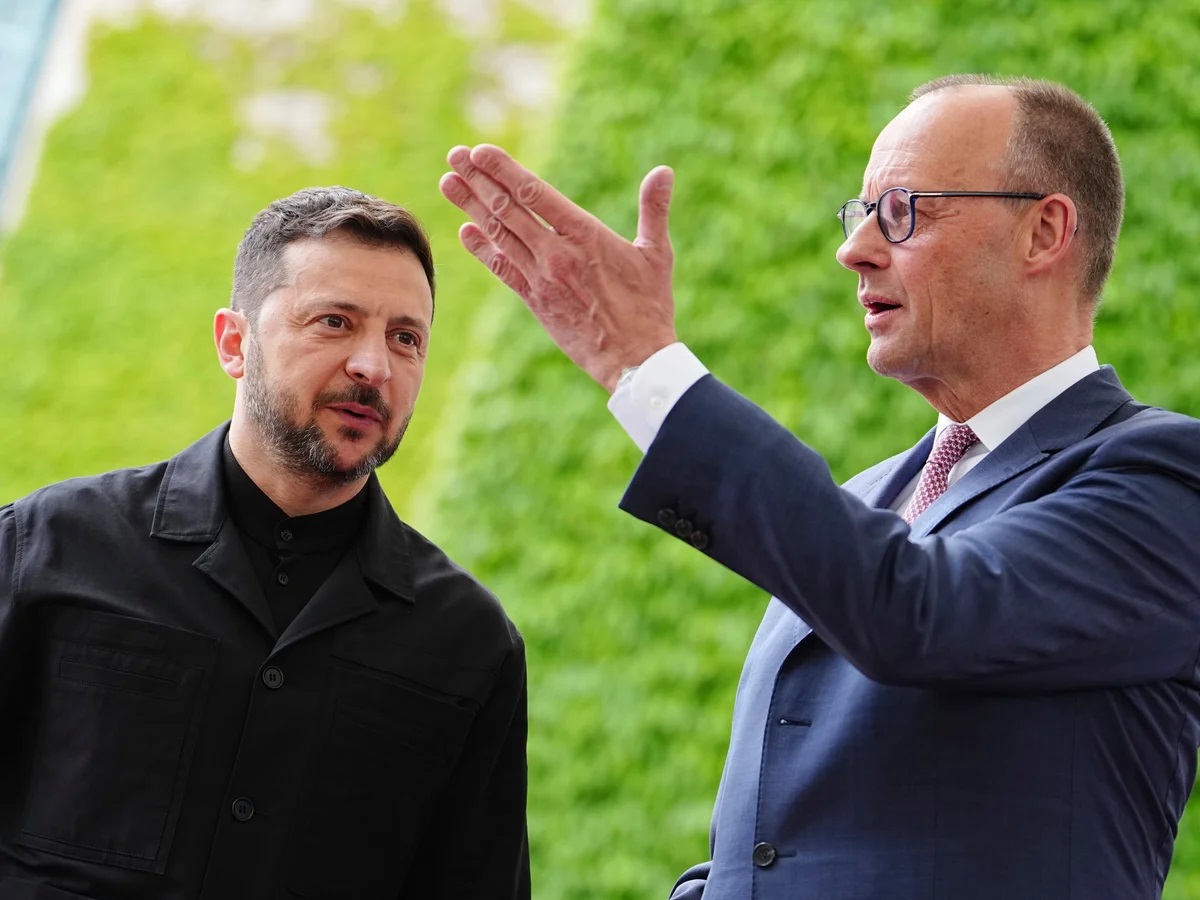Ukrainian President Volodymyr Zelensky on Wednesday, May 28, 2025, warned that Russia has stationed approximately 50,000 troops near Ukraine’s northeastern Sumy region, signaling a potential large-scale offensive.
Zelenskyy disclosed this during an emergency meeting in Berlin with Germany’s recently appointed Chancellor, Friedrich Merz.
The summit was convened in response to escalating tensions and the growing threat posed by Russian forces along Ukraine’s borders.
Zelenskyy emphasized that Russia’s most formidable military presence is currently concentrated at the Kursk front, a key strategic area bordering Sumy.
According to him, these forces are positioned to drive Ukrainian troops out of the Kursk region and prepare for further operations targeting Sumy.
He noted that Kyiv has already initiated defensive measures to prevent large-scale Russian assaults in this area, which lies adjacent to Russia’s Kursk Oblast.
This region gained particular attention last August when Ukrainian forces successfully executed a surprise incursion using advanced Western weaponry and drones.
Chancellor Merz received Zelenskyy in Berlin with full military honors at the German chancellery.
It marked his first high-level diplomatic engagement with Ukraine since assuming office.
The visit focused on reinforcing Germany’s continued support for Ukraine and exploring pathways to achieving a ceasefire in the ongoing war, which has now entered its third year.
Stefan Kornelius, a spokesperson for the German government, reiterated Berlin’s commitment to standing by Kyiv.
Merz has signaled he will maintain, if not intensify, Germany’s support, which has already been substantial under previous leadership.
One of the most closely watched aspects of the meeting was speculation over whether Germany would supply Ukraine with longer-range weaponry, such as the Taurus missile system.
Earlier this week, Merz suggested that range limitations on German arms deliveries to Ukraine were no longer in effect.
However, the German government has since clarified that these restrictions had already been lifted prior to Merz’s remarks, suggesting no recent policy shift.
It is anticipated that Merz will propose a substantial support package for Ukraine, reportedly worth several billion euros.
This aid is expected to include enhanced air defense systems, a wider array of weapons, and financial assistance.
These will enable Ukraine to purchase additional military equipment from the United States.
It remains uncertain whether this new aid package will be in addition to the €3 billion in military assistance previously approved by the outgoing German administration in March.
Furthermore, discussions in Berlin are likely to explore a long-term strategy for supporting Ukraine’s self-sufficiency in defense.
One key component of this strategy could involve Germany supplying Ukraine with the technological infrastructure necessary to produce and maintain its own long-range weapons, such as rockets and cruise missiles.
This approach could allow Kyiv to better defend itself without further inflaming concerns within Germany about direct involvement in the conflict.
Domestically, Merz faces pressure to support Ukraine while also avoiding the perception of escalating German military engagement.
Russian officials have reacted strongly to Merz’s plans.
Speaking at a security conference in Moscow, Russian Foreign Minister Sergei Lavrov criticized Germany’s ambition to build Europe’s most powerful military.
He described it as “very worrying,” drawing parallels to historical periods when Germany’s military dominance had catastrophic consequences.
Zelenskyy and Merz were scheduled to hold a joint press conference at 1:30 PM local time before engaging with German business leaders to discuss Ukraine’s postwar reconstruction efforts.
On the battlefield, Zelenskyy reported that Ukrainian forces had recently pushed Russian troops back by approximately four kilometers.
However, Russia continues to advance in the eastern Donetsk region, particularly near the town of Kostiantynivka.
In recent days, Russian forces captured four border villages, intensifying the fighting near the frontlines.
Meanwhile, Russian media reported Ukrainian drone attacks on two drone manufacturing sites.
The Ukrainians reportedly launched one near the northwestern outskirts of Moscow and the other in Dubno, around 80 kilometers from the capital.
Details regarding casualties or damage remain unverified.
Although Russia’s defense ministry claimed that 296 Ukrainian drones were intercepted over Russian territory.
Air traffic was temporarily halted in Moscow and other areas due to the threat.
In Ukraine, Russian missile strikes injured eight people in the Kharkiv region.
Ukrainian officials stated that five ballistic missiles were fired, further underscoring the ongoing intensity of the conflict.







